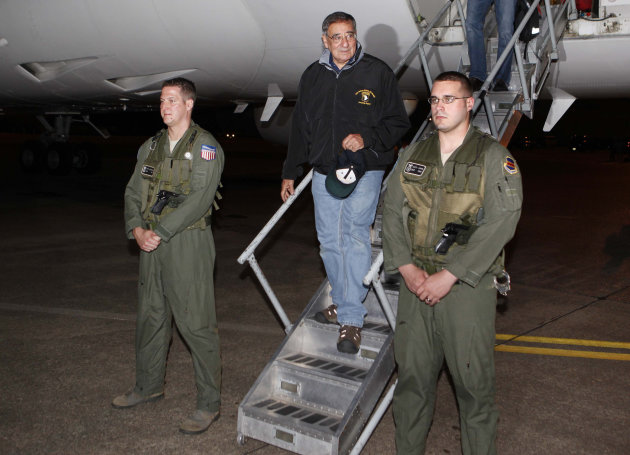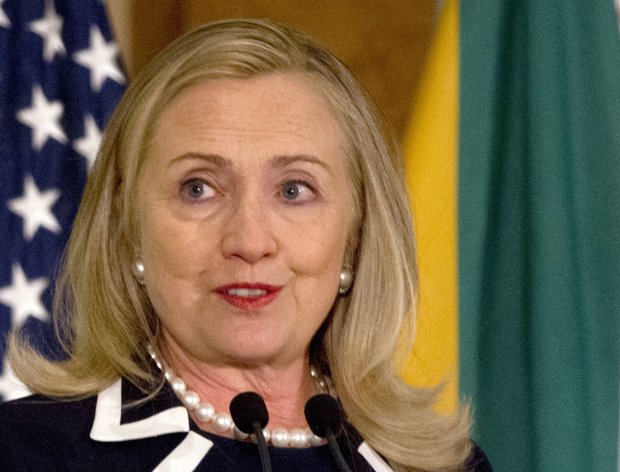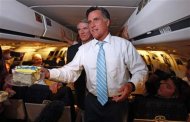Folks,
If you mess your behind and someone cleans it for you, who do you blame? Will you take offense on your help? Is this from Mitt Romney, not another flip flop taking a dive on missed and confused thinking......???......What is your take......???
Government is the institution (tool) from where Public/People voices/needs are channeled and demands are met in a shared Plan of Action, manufactured and delivered to people/public in a timely manner.
Having realized the force and power at which the Government can do and reach out effectively, it is evident that the war is between the rich and the poor of the world.......The Rich becomes more greedy and want everything for themselves and don't care or want to share with the poor but engage those they recruit or accept to be their agents on commission........ With this type of practice, there is no balance……..it is the reason America was in serious cricis on the verge to collapse when President Obama became the President.
It was not easy, the problems President Obama found was humongous; it could not have been resolved within 4 years. Former President Clinton confirmed that to the world…..that no President could have achieved what President Obama did in just 4 years……..and yes, it will require atleast more than 2 more years for the situation to fizzle down and be effective because President Obama (who understands better the Pythagoras' theorem of the mathematics of building a Nation and the world under peace and unity while engaging everyone and where everyone matters irrespectively) has put what it takes as road map on the Recovery Act to put America and the world on the path to Progressive Development and growth.
Success of America cannot be done in isolation, segrigation or discriminate under divisiveness of Faith, Creed, Nationality, Tribal linage, color or class…………
It is therefore unfortunate and illogical that we are presently pulling strings on the war between the rich and the poor; drugging us behind from where we have come from, in such that, the rich fight, are set to box and own to control the Government by whatever means for themselves to do what they want and not what the rest of the people/public want.........because of their Comfort Zones, it is why they want to fully control the Government for their own special interest........
Now Folks, this is the reason why they hate President Obama who is the middle-man for a fair game; who want to give both rich and poor a fair share of (Give and Take) in the game of the National public service delivery to all people and when the going gets tough.....it should be placed on a people/public platform or through a referendum to solicit for intelligent logical thinking of opinions and ideas for fair shared sacrifice..........where everyone shares in the burden of sacrifice……..to avoid going back or taking others to slavery for masters of selfish and the greedy …… therefore, do you think this leaves the Blacks people of the world who time and again suffered under the marginalization, intimidation, discrimination and segregation of the 1% rich who think for self greed and feel the rest should be treated unfairly, inhumanly and that the disadvantaged and the poor are fit to shoulder the burden of the 1% rich and must forever live in some sort of miseries.....in poverty, in sufferings, and in the slaughter houses........With poor education or no education facilities…..???
What do you think is fair between the Rich GOP Republicans and the ordinary disadvantaged people and the poor of the world???.........Why do you think the rich do not want to pay their fair share of TAXES.....aaaaaaaand they target and want African Wealth Resources for free while killing at will and stands on the way for Africa's Democracy and engage the African corrupt Governments with handouts…..so that African Government becomes dysfunctional…….It is what is an in thing here why they do not want THE GOVERNMENT to fairly deliver to all people, they claim they are the job creators and it is not the Government who creates jobs……and yet they stick their firm beliefs that they want FREE BUSINESS ENTERPRISING........To do what they want and are able to pay huge sums of money for Political campaign to favor those who must put their interest first; why they pay huge sums of money to their CEOs, Lobbyist with law background, and also pay to Offshore businesses and outsource jobs under Chinese/Asianic Commission Agency to scramble to Africa......???
Wake up People…….Wake up…….. and ask yourselves, which Religion advocates or teaches people to kill each other for selfishness and greed ????
The problem affecting America in all spheres be it Political, Economical, or Social affairs; is not a problem of America alone, (taking into consideration that America is a Nation of all Nationals from all over the world)……..It is a Global problem intertwined affecting the whole regions of the world…….It inclusively becomes a problem of Africa, Asia, Europe, Arab Republic, the Caribbean Islands, the Bahamas and Mexico; just the whole world… …..
We shall not be fooled by the Republican Corporate Special Interest that are after monopolizing livelihood and survival for themselves and for selfishness and greed; it is not right……We must play fair to all, ……… Have your say people ……Each individuals vote counts……..It is the people who are the bosses of their own destiny, and it is all our concern for better livelihood and survival for all that we all must vote with our conscious…..Voters must decide to vote Responsible Public Servants who will serve with integrity to put America the Light that shall Shine the World favorably..........
Thank you all and stay engaged...........!!! Judy Miriga Diaspora Spokesperson Executive Director Confederation Council Foundation for Africa Inc., USA http://socioeconomicforum50.blogspot.com Dr. Boyce Watkins On The Conflict Over Income Inequality, Dr. King's Radical Economic Message Uploaded by rolandsmartin on Jan 23, 2012 There's a growing conflict between rich and poor in America. A poll this month from the Pew Research Center finds that about two thirds of the public -- that's 66 percent -- believe there are very strong or strong conflicts between the rich and the poor. That's up 19 points since 2009. When you break that down -- that increase, if you will, Black folks believe there are conflicts between rich and poor. That increased by 8 percent, but for White Americans, the increase was 22 percent. This conflict over "income inequality," as the Democrats call it, or "class warfare," as the Republicans see is, is already a major theme of the 2012 election. #1 of 2. Republican Gov. Deal Remove Blacks, 30 Deaths 1994-2009, D.A. David Miller Uploaded by George Boston Rhynes on Jan 11, 2012 January 11, 2012 SUBJECT: Keeping Rev. Martin L. King Jr., dream alive in the State of Georgia and Quitman 10 news worthy information Ignored including a branch of the NAACP being started in Brooks County Georgia. How could this be excluded from the history of South Georgia? We make mockery of Rev. Martin L. King Jr., when we ignore Voting Rights and Voter suppression in the State of Georgia. I was 100% certain within my mind that Georgia Governor Nathan Deal would remove the majority Black African Americans Representation on the Brooks County Board of Education. Moreover, I have NOT seen one item in the Executive Order showing that these Outstanding Board Members had any negative impact on the daily operation of the Brooks County School System. HISTORY OF QUITMAN-BROOKS COUNTY MUST BE REVIEWED BY ALL AMERICANS! THIS CASE JUST MAY HIGHLIGHT WHAT HAS BEEN NEEDED HERE IN SOUTH GEORGIA FOR OVER A CENTURY. WE KNOW THAT OUR GOD HAS ALWAYS MADE A WAY OUT OF NO WAY AND IN THE END THIS SOUTH GEORGIA AREA WILL EVENTUALLY BROUGHT FORWARD TO THE REALITIES OF TRUTH, JUSTICE AND EQUALITY FOR ALL CITIZENS HERE IN SOUTH GEORGIA. 1. the TRUTH made a real reality in Brooks County Georgia and South Georgia in General in 2012.... http://www.youtube.com/watch?v=sLdDUec48pE&feature=plcp&context=C362f... The Importance of Education for African Americans Uploaded by PolNerdsofAmerica on Aug 15, 2010 My thoughts on the importance of education in the African American community. Rachel Maddows destroys Gov. Walker about Paul Ryan's lies on the GM plant in Wisconsin You have a lot to learn. Being also Italian and having lived in France,we refer to Italy or France as "la Repubblica Italiana" and "La Republique Francaise", but when we study history we refer to these countries as Democracies ... This is the same which is written in the "OFFICIAL FEDERAL BOOKLET" you have to study to become an American citizen ... AMERICA IS A REPRESENTATIVE DEMOCRACY. PERIOD!!! BTW DEMOCRACY FROM GREEK = THE POWER OF THE PEOPLE, REPUBLIC FROM LATIN = THE PUBLIC THING Jon Stewart: Freedom Packages (Libya). America: War for the Rich, Taxes for the Poor Uploaded by mrfreedomdemocracy1 on Mar 22, 2011 Jon Stewart Rips U.S. Attack On Libya: 'Don't We Already Have Two Wars?' M.E. Dyson debates Pat Buchanan over Obama-Dobson argument Uploaded by shibbolethed on Jun 25, 2008 from Hardball with Chris Matthews, June 24, 2008. Best black vs white debate on youtube - REP DAT Uploaded by Leweydagga on Mar 5, 2009 http://repdat.net Panetta concerned Asia disputes could expandBy | Associated Press – 1 hr 43 mins agoTOKYO (AP) — U.S. Defense Secretary Leon Panetta said Sunday he is concerned the territorial disputes in the Asia-Pacific region could spark provocations and result in violence that could involve other nations, such as the United States. Speaking to reporters on his plane en route to a weeklong trip in the region, Panetta said he will urge countries here to find a way to peacefully resolve their problems. He arrived Sunday in Tokyo, the first stop of his trip. "I am concerned that when these countries engage in provocations of one kind or another over these various islands that it raises the possibility that a misjudgment on one side or the other could result in violence and could result in conflict and that conflict would then, you know, have the potential of expanding," Panetta said. The defense chief said his conversations with the Japanese and Chinese would echo what U.S. Secretary of State Hillary Rodham Clinton told them earlier this month — that they must find a process for settling the disputes. The U.S., he said, does not take a position with regard to the disputed lands. He said he will strongly urge the Chinese to participate in the process so they can take part in a forum to resolve the issues. Violent protests against Japan erupted across China this weekend over uninhabited islands. Although Japan has controlled the islands — called Diaoyu in Chinese and Senkaku in Japanese — for decades, the Chinese were angry that the Japanese government purchased the East China Sea islands from their private owners. China saw the purchase as an affront to its claim and as further proof of Tokyo's refusal to negotiate over them. There also have been recent flare-ups over territorial battles between China and many of its other neighbors, as well as between Japan and South Korea. Japan and South Korea are at odds over an islet claimed by both, and China stoked anger over its increasingly assertive stance regarding its claims over resource-rich waters to the south and east. "We're going to face more of this," Panetta said. "The countries are searching for resources, there (are) going to be questions raised as to who has jurisdiction over these areas." This will be Panetta's third trip to Asia in 11 months, reflecting the Pentagon's ongoing shift to put more military focus on the Pacific region. The trip will also include a stop in New Zealand. Panetta's visit to Japan is also likely to include discussions about the deployment of V-22 Ospreys there. Thousands of people have protested the hybrid aircraft's planned use, saying they are unsafe. The Pentagon plans to deploy 12 of the aircraft, which take off and land like a helicopter but fly like a plane. U.S. officials have assured Japanese leaders the Ospreys are safe. China in focus as Clinton heads to South PacificBy | Associated Press – Thu, Aug 30, 2012WASHINGTON (AP) — Secretary of State Hillary Rodham Clinton will try to reassert American interests in the Asia-Pacific region in the face of China's growing influence as she kicks off a six-nation trip that will take her from the South Pacific to Russia's Far East. Clinton left Washington on Thursday on a trip that will keep her half a world away from U.S. politics at the height of the presidential conventions. But her travels will put her at the center of rising tensions over territorial disputes involving China and its smaller neighbors in the South China Sea. Clinton visits Beijing at the midpoint of the 11-day tour that begins in the remote Cook Islands, where she will be the first secretary of state to visit the South Pacific island chain that's home to just 10,000 people. On the main island of Rarotonga, she will attend an annual gathering of officials from Australia, New Zealand and the tiny nations scattered across the Pacific Ocean. U.S. officials said Clinton will stress America's commitment to the sprawling yet sparsely populated area. It is threatened by rising waters, which are attributed to climate change, and faces a choice of whether to continue tight ties with the West or embrace burgeoning Chinese investment and power. From there, Clinton heads to Indonesia, the seat of the secretariat of the Association of Southeast Asian Nations, whose members are sharply divided over how to deal with China's expansion and conflicting claims over territory in the South China Sea. A summit of regional leaders in July failed to reach consensus on how to handle the disputes. Clinton will press them to find common ground and hash out a framework for negotiating with China, U.S. officials said. Defense Secretary Leon Panetta will make his first visit to China as Pentagon chief in a few weeks. After visiting China, where she will raise the South China Sea issue along with matters such as the unrest in Syria and Iran and North Korea's nuclear programs, Clinton will stop in East Timor, Brunei and then represent the U.S. at a summit of leaders from Pacific Rim countries in Vladivostok, Russia. Clinton will be the first secretary of state to travel to East Timor when she makes a brief stop in Dili, the capital. In another U.S. diplomatic first, the well-traveled Clinton will become the only secretary of state to touch ground in all 10 members of ASEAN when she holds talks in the small oil-rich nation of Brunei. Clinton made history in December by going to Myanmar, which is emerging from decades of isolation. After Brunei, Clinton will move on to Vladivostok to stand in for President Barack Obama at the Asia-Pacific Economic Cooperation forum, which is expected to center on trade and food security. In meetings with foreign leaders, Clinton also will discuss Syria, Iran and North Korea, and will lay the groundwork for the upcoming U.N. General Assembly, officials said. Panetta seeks closer Sino-U.S. ties as China military expandsBy David Alexander | Reuters – 2 hrs 9 mins agoTOKYO (Reuters) - Defense Secretary Leon Panetta will look for ways to deepen U.S. military relations with China during a visit to Asia this week, even as he works to bolster U.S. alliances in the region as part of a strategic shift that Beijing views with concern. Panetta, who arrived in Tokyo on Sunday on his third trip to Asia since becoming defense secretary, will discuss the realignment of U.S. military basing in Japan and expanding ballistic missile defense cooperation before heading to Beijing to try to deepen and broaden military-to-military ties. He wraps up his visit with defense cooperation talks in New Zealand. Senior U.S. and Chinese defense officials have made an effort to push their military relationship forward since it resumed a year and a half ago after a bitter break over U.S. arms sales to self-ruled Taiwan, which Beijing views as a breakaway province. But despite high-level visits by top officials, relations between the Pentagon and the People's Liberation Army are marked by wariness and mistrust. "This is a relationship that has in the past been characterized by a lot of ups and downs and an on-again, off-again cycle that reflected the lack of a solid foundation ... sufficient to weather the type of turbulence that's natural in a relationship that's as broad and complex as the one that we have with China," a senior defense official said on condition of anonymity. "We're not there yet in terms of where we'd like to be in our military-to-military relationship, but visits like the one that Secretary Panetta is going to have ... sustain the forward progress that we've been able to make over the past several months." U.S. defense officials pressed for a restoration of military-to-military ties with China because of concerns about the direction of Beijing's military modernization efforts, including anti-ship missiles, stealth aircraft and its first aircraft carrier. Many of the weapons worry U.S. military leaders because they appear to be aimed at countering U.S. strengths and denying U.S. access to waterways in the region. U.S. defense officials believe that by engaging in cooperative efforts with the Chinese military, the two sides will gain greater familiarity with each other's operations and develop transparency and communications channels that can help avoid misunderstandings that could lead to conflict. But Dean Cheng, a China analyst at the conservative Heritage Foundation think tank in Washington, said it wasn't clear exactly what the upside to renewed ties has been. "The relationship is not in the deep freeze, but there is at best limited evidence of any kind of progress," he said. "The Chinese military remains averse to transparency as the West understands it and remains hostile to things like U.S. military ships transiting China's EEZ (exclusive economic zone) without prior permission." The push for deeper ties comes at a time of heightened tensions in the region, with China locked in disputes with U.S. allies like Japan and the Philippines over potentially resource-rich islands in the East and South China Seas. The United States has urged the parties involved to settle their disputes peacefully, a point Panetta said he would raise in Beijing. 'WE DON'T WANT PROVOCATIVE BEHAVIOR' "The United States does not take a position with regards to territorial disputes, but we do urge not just China but the other countries that are involved to engage in a process in which they can peacefully resolve these issues," Panetta told reporters on his plane en route to Tokyo. He said he would encourage China to engage in the dispute resolution process promoted by ASEAN, the Association of Southeast Asian Nations, in an effort to try to resolve the disagreements peacefully. "What we don't want is to have any kind of provocative behavior on the part of China or anybody else result in conflict," Panetta said. "And my purpose will be to urge that they engage in the effort by the ASEAN nations to try to work out a format for resolving these issues." China's claims over much of the South China Sea, including the Spratly and Paracel islands, have put it at loggerheads with Vietnam, the Philippines and other Southeast Asian nations. A similar dispute has set China against Japan in the East China Sea. China has been irked by the U.S.-backed proposals for a multilateral approach to resolving such disputes, preferring to negotiate separately with each of the far less powerful Asian claimants. The U.S. defense secretary said he hoped to talk to Chinese defense officials about cooperating on a range of additional issues where the two countries have common interests, including nuclear proliferation, freedom of navigation, piracy, trade and humanitarian assistance. "These are all areas where we can work together to try to provide security support for the Asia-Pacific region that will enhance the ability of that region to be able to prosper in the future," Panetta said. "Those are some of the areas that I'd like to work on." But even if Panetta is successful in moving U.S.-China cooperation to a new level, it is still not clear the relationship would deliver the kind of communications U.S. officials hope is possible. "Part of the question is what we want out of the mil-mil (military-to-military) relationship. If it is simply to have a channel available, then it is succeeding," Cheng said. "If, however, it is to have a channel of communications that can avert a crisis or tamp down escalation at critical moments, that is unlikely to happen under any circumstances. "The PLA's procedures and organization, including the important role of political officers, does not match against how the US tends to operate." (Editing by Nick Macfie) Romney hits Obama on looming "fiscal cliff"By Steve Holland | Reuters – 1 hr 24 mins agoBELMONT, Massachusetts (Reuters) - Republican presidential candidate Mitt Romney accused President Barack Obama on Saturday of standing by while a looming budgetary calamity unfolds in Washington as he sought to regain his footing after a tough week on the campaign trail. Romney leaped into the debate over the "fiscal cliff," the potential for an end-of-the-year uproar when some $109 billion in across-the-board spending cuts kick in unless Obama and Congress reach a deficit-reduction deal to avert them. Bush-era tax cuts also expire at year's end. The Washington debate mirrors the campaign battle between Obama and Romney. Democrats want to make up the shortfall by increasing taxes on wealthy Americans while Republicans favor spending cuts. "Political gridlock threatens to plunge us back into recession, but instead of seeking bipartisan solutions, President Obama is passively allowing us to go over a fiscal cliff," Romney said in his weekly podcast. The White House said in releasing a breakdown of the cuts on Friday that it was congressional Republicans who are standing in the way of a deal because they refuse to accept a more balanced approach. The White House and Congress, Democrats and Republicans, including Romney's vice presidential running mate, Paul Ryan, agreed on the automatic cuts under an August 2011 deal. Romney, who has vowed to build up the U.S. military if elected on November 6, has singled out for criticism the $54 billion in defense cuts that would kick in at year's end. He says this is no time to shrink the Pentagon's budget. "What kind of commander-in-chief forces Americans to choose between massive tax hikes that will undermine the economy and massive cuts to our military that will undermine national security?" said Romney spokeswoman Andrea Saul. Romney is ending a rough week during which he fell behind Obama in the polls and came under criticism from Democrats and some Republicans for making a campaign issue of the deaths of four Americans killed by Muslim protesters at the U.S. diplomatic mission in Benghazi, Libya. The candidate took the day off on the campaign trail on Saturday. He spent part of the afternoon watching one of his grandson's soccer games. Romney travels to Colorado and California on Sunday. (Editing by Xavier Briand) Wisconsin will seek to enforce union law while appealing rulingReuters – 9 hrs ago(Reuters) - Wisconsin's controversial law that limited the rights of many public-sector union workers should stay in place while the state appeals a judge's ruling that found parts of the measure unconstitutional, the state's attorney general said on Saturday. Attorney General J.B. Van Hollen said he would appeal Dane County Circuit Court Judge Juan Colas' ruling striking down parts of the law approved by the Republican-led Legislature last year. "We also will be seeking a stay of Friday's decision pending appeal in order to allow the law to continue in effect as it has for more than a year while the appellate courts address the legal issues," Van Hollen said in a statement. Republican Governor Scott Walker pressed for the sweeping changes to union rules as part of a package to eliminate a state budget deficit. The proposals sparked massive union-backed protests at the state Capitol in Madison and efforts to recall Walker. Walker easily survived a recall election in June and has become a champion for fiscal conservatives. Colas' ruling stemmed from challenges brought by unions that represent Madison school teachers and Milwaukee city employees. The immediate effect of his ruling is unclear. Colas ruled that eliminating collective bargaining rights for municipal employees including teachers violated the workers' right to free speech, association and equal protection. He also found that the law's requirement that Milwaukee city workers make pension contributions violated a home-rule provision in the state constitution. The law has forced most public-sector union workers, including teachers, to pay more for health insurance and pensions, limited their pay raises, made payment of union dues voluntary and forced unions to be recertified every year. There have been several legal challenges to the law. A federal judge in March blocked the provision that dealt with voluntary collection of dues and annual recertification votes. (Reporting by David Bailey; Editing by Peter Cooney)
Romney: 'I'm Not Going to Worry About the Campaign'ABC OTUS News – Fri, Sep 14, 2012 Republican candidate talks to George Stephanopoulos about remarks regarding recent embassy attack. Mitt -- your Dad & Barack & Biden relased 12 years of tax returns! Where are yours? What the hell are you hiding? JohnReport Abuse If Romney loses it will be because he is so out of touch with normal Americans, like the majority of republicans. Stop telling me my life will be better if you and your rich friends have lower taxes. Even many republicans are too smart to believe that crap in 2012... dino • Report Abuse Jobs left this country for one reason: WAGES. China pays $1.60 an hour. I never heard of someone getting laid off due to taxes or regs. Those jobs are not coming back either. $30 an hour for installing hubcaps? no way no how. Americans better get ready for a real surprise. Quit thinhking you are... More
film381 • Report Abuse I sure as hell don't want a President that cares not about the important things ...such as his own campaign. He could very well think the same about the public...oh wait...he already does thatReply v1/comments/context/7921a5c3-0181-330a-9f87-fec7f504a022/comment/1347634323704-4dfe28f0-1d95-49f4-bfe3-4e0366df9a3f donaldb • Report Abuse they blew it by saying they were coming after the ssi, and medcare, voucher for the seniors! way to go ..o, but giving money to the mid east is better thing to do!! they love us wright!!2 Replies LindaReport Abuse
Romney: 'I'm not concerned about the very poor' 1 Feb 2012 11:48am, EST By: Now Alex Wagner The NOW panelists discuss Mitt Romney's gaffe from Wednesday morning when he said he is not concerned about poor Americans. All political candidates -- just like all non-politicians -- make verbal gaffes. On Monday, for example, Republicans jumped on President Obama for saying the word "interesting" when a woman asked him a question about her unemployed husband. (In that exchange, Obama asked the woman to send her husband's resume to him.) But in politics, what becomes damaging is when a verbal gaffe fits a pre-existing narrative. And that's what happened today when Mitt Romney uttered the words: "I'm not concerned about the very poor." In an interview this morning, CNN's Soledad O'Brien asked Romney about perceptions that he doesn't understand the needs of average Americans. In response, Romney said:
When O'Brien followed on Romney's I'm-not-concerned-about-the-very-poor comment, the presidential candidate responded: The challenge right now – we will hear from the Democrat Party the plight of the poor, and – and there's no question, it's not good being poor and we have a safety net to help those that are very poor.
(In fact, according to the non-partisan Tax Policy Center, the largest benefits of Romney's tax plan go to the wealthy, not the middle class.) Romney's comment about not being concerned about the poor is his latest statement that his rivals -- either Democratic or Republican -- could use to portray Romney as being out of touch with average Americans. |





